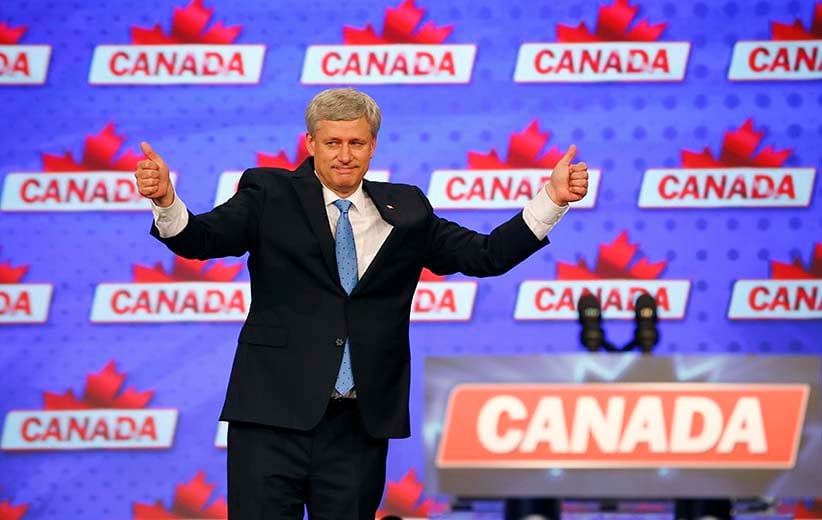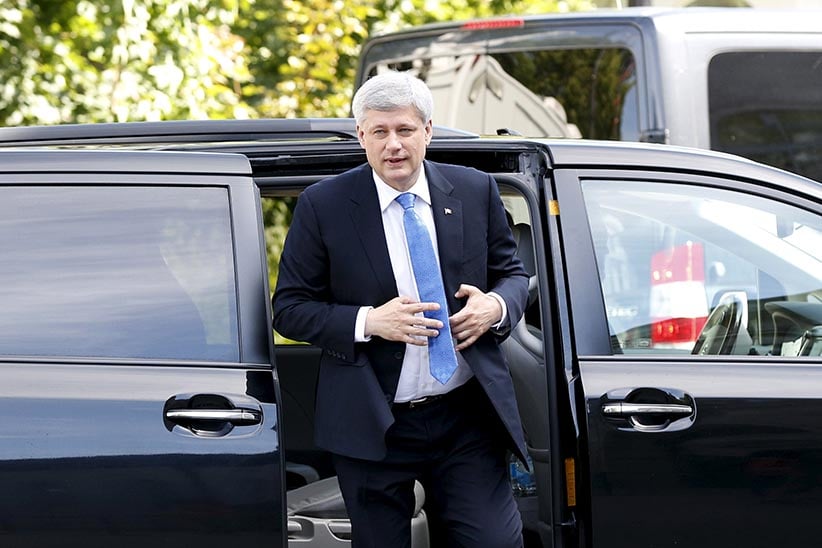How it all ended for Stephen Harper
A silence choked the air when the results came in. Stephen Harper struck proud notes in his political eulogy—but an era had passed.
Share

When people file into a funeral parlour for someone beloved, they shuffle their feet, solemnly say little, force smiles easily mistaken for grimaces as they shake hands with fellow travellers they haven’t seen in too long. A few sighs of “Oh, I’ve been better,” met with sympathetic nods. Later, plenty of hugs when the relatives take their seats. This was how Conservatives carried themselves Monday in defeat.
Stephen Harper’s supporters had just begun to enter the convention centre hall after Alberta polls closed as the video screens declared a Trudeau government. A silence choked the air.
“I hate to hear this. I really hate to hear this,” Ric McIver said to nobody in particular, as CTV’s decision desk announced an early verdict that would stick. McIver is the interim leader for what remains of Alberta’s provincial Tories. It was a scene he and many right-leaning Albertans could easily recognize from May’s provincial election—a dread that loss was coming, the other guy’s colour spreading onto parts of the map they would have never expected a few weeks or even days before opponents began their stampede in one dominant direction. Fatally for the Harper Conservatives, national voters stormed away from orange and into the deep red.
There were many questionable choices in the Conservative campaign’s endgame, from the game-show cash register stunts to letting Rob and Doug Ford within 500 feet of a politician hoping to position himself as a credible choice. The final one had to be the first song played over the hall’s loudspeaker: Enter Sandman by Metallica. “Exit light, enter night. Take my hand, off to never-neverland.”
But aside from that apparent backhand at the return of Trudeau rule, the departing Prime Minister struck proud notes in his own political eulogy. A voiceover announcer introduced him. Harper walked into the hall with his wife, but stood at the lectern on a long, narrow stage on his own.
“We put it all on the line, we gave everything we have to give,” Harper said. “And we have no regrets, whatsoever. Friends, how could we? We remain citizens of the best country.”
He lauded his tax measures, his late-term budget balance, his trade agreements, his bid to give a nation that had fancied itself as peacekeepers some military gruffness.
“Know also this: The disappointment you also feel is my responsibility, and mine alone,” he told the crowd. Whether or not speechwriters gave him subsequent lines in his speech about his resignation as Conservative leader, he did not deliver any. In a nod to the tradition he has built, Harper did not speak to reporters. Aides suggested he might not. He left it to a surrogate, the party president, to issue a statement announcing his news, and another surrogate to explain Harper’s own likely enduring silence on this matter. He chose to say something else, came a spokesman’s explanation to perplexed reporters. Conservatives quickly headed for the exits, some likely unaware their party was now headless. As one Twitter user noted, Harper and fellow Calgarians will wake up Tuesday morning with Naheed Nenshi as their mayor, Rachel Notley as their premier and Justin Trudeau as their prime minister-designate.

The signs were there throughout the day that it would be bad, though perhaps not this bad. The party never notified journalists of where Harper would be voting, so only the Canadian Press pool crew could get the perennial photo op. Conservatives wouldn’t give the reporter the voting location’s address, and drove him to the polling station, at a Royal Canadian Legion branch.
Results rolled in at the same venue where Harper celebrated his three consecutive victories. But the space was much smaller than it was in 2011. The hall was cut in half by black curtains, TV screens, and Canadian flags that—for Stephen Harper—seemed relatively modest, a mere six arm spans wide. Instead of inflatable blue thundersticks, small flags sat on each chair, the patriotic red-and-white numbers they hand out by the sackful on Canada Day. The signs came out after the results rolled in, when there was a now-former leader to cheer for.
Conservatives will now get an interim party leader, a possibly fractious party race between Jason Kenney and eventually perhaps an Anyone But Jason Kenney, and a long four years to make a comeback.
Some party activists and organizers remained proud of their campaign, crediting the majority defeat to the NDP’s tremendous collapse. But some felt less need to follow the former leader’s no-regrets line, and second-guessed the Conservative strategy. “What was there to vote for?” asked one former cabinet aide. “ ‘We’re going to keep things going, the way they are?’ That’s not going to get people excited in a change election.”
In 2004, Harper had to accept a Liberal win in his first election as Conservative leader, in a race his backers thought was theirs. As he congratulated the Liberals, the thunderstick-wagging crowd began booing. Harper tried to redirect the crowd by clapping off-mic, and the crowd followed suit.
Eleven years later, as Harper welcomed another Liberal’s victory—“Canadians have elected a Liberal government, a result we accept without hesitation”—there were no boos. Instead, the crowd politely applauded, an acknowledgement an era has passed.
[widgets_on_pages id=”Election”]